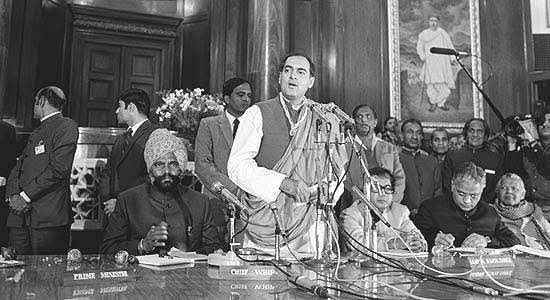
The Supreme Court on Friday adjourned till October 17 the hearing on a petition seeking the premature release of Nalini Sridharan. Currently, She is serving a life sentence in the assassination case of former prime minister Rajiv Gandhi. The Tamil Nadu government’s favour for the premature release of Rajiv Gandhi assassination case convicts is a ray of hope for convicts Nalini Sriharan and R P Ravichandran who are seeking release. After the release of AG Perarivalan, directed by the Supreme Court, convicts Nalini Sridharan and R P Ravichandran also moved to the Supreme Court seeking a release.
The assassination of Rajiv Gandhi
The 6th Prime minister of India Rajiv Gandhi was assassinated by the Liberation Tigers of Tamil Eelam. Rajiv Gandhi was assassinated on the night of May 21, 1991, at Sriperumbudur in Tamil Nadu by a woman suicide bomber, identified as Dhamu, who was one of the core members of the LTTE group at a poll rally.
According to the Minhaz Merchant’s biography of Gandhi titled Rajiv Gandhi, End of a Dream- members of the “core” group comprised Shivarasan, Murugan, Arivu, Shubha, and the three loc, all “innocents” Bhagyanathan, Nalini and Padma. Rajiv, Gandhi was scheduled to address a rally there, where during the assassination 16 people including Rajiv Gandhi and Dhanu were killed in the blast, while 45 persons were critically injured. In 1998 a trial court ordered the death penalty for this accused, and from here series of mercy petitions and controversies around convicts began.

History of twists and turns in the case of convicts.
Under the Terrorist and Disruptive Activities (Prevention) Act, 26 accused were sentenced to death in 1998 by a court in Chennai. However, the Supreme Court in 1999 acquitted 19 of the 26 convicts who have commuted the death sentences to life imprisonment of three named – Jai Kumar, Robert Pias, and Ravi Chandran. And upheld the death sentence for only four named Nalini, her husband Murugan, Santhan, and AG Perarivalan.
In 2000, the death sentence of Nalini was commuted to a life sentence following a plea by Sonia Gandhi, Rajiv’s wife. The Supreme Court commuted the three death sentences upheld in 1999 to life imprisonment in 2014.
Pending petition and rejection.
The power to grant pardon is in essence an executive function to be exercised by the Head of the State after taking into consideration various matters. The power of granting pardon to the executive is an act of grace to an accused or a convicted person that takes several forms such as reprieve, pardon, respite, commutation, remission, etc.
Articles 72 and 161 of the Constitution of India, the President, and Governor can grant pardon, suspend, remit, or commute a sentence, once passed by the courts.
However, in the case of Rajiv Gandhi’s convict, there is a history of providing mercy petitions and rejection. In 2001 three death convicts including santhan Murugan and perarivalan submitted their mercy pleas to the president of India however in 2011, after 11 years on August 11, the then president of India Pratibha Patil rejected their mercy petitions.

Tamil Nadu government stands on the premature release of convicts.
The Supreme Court sought a response from the Centre and Tamil Nadu government on September 26 regarding the plea seeking premature release. Tamil Nadu government has filed its get reply to the special leave petitions filed by Rajiv Gandhi assassination convicts Nalini Sridhar and R.P Ravichandran seeking premature release, the state government has favored the premafavoredease. where the state government submitted that it is the competent authority to decide the petitioner’s pleas under article 161 of the constitution.
It referred to the constitution bench verdict of the top court in the Maru Ram versus Union of India (1981 verdict) in which Article 161 of the constitution was authoritatively summed up and said that the action of commutation and release can be under a governmental decision.
Where It also stated that the decision of the cabinet dated September 9, 2018, about recommending the remission of life sentences to the governor is final.
Currently, Nalini and Ravichandranaran have been on ordinary leave (parole) from December 27, 2021, till date as sanctioned by the Tamil Nadu government under Tamil Nadu suspension of sentence rules 1982.
Read more: The Nation pays Tribute to Rajiv Gandhi as it marks his 77th Birth Anniversary.












